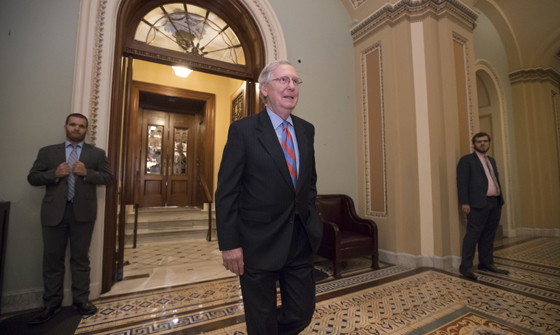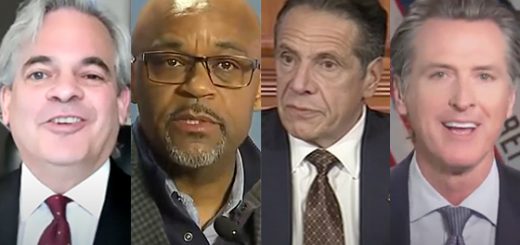Health care and political word games.

Senate Majority Leader Mitch McConnell leaves the Senate chamber after a vote as the Republican majority in Congress remains stymied by their inability to fulfill their political promise to repeal and replace “Obamacare.” (AP Photo/J. Scott Applewhite)
Listen To You Tell Me Texas Friday 7/28/17
Download
The stock-in-trade for politicians is words and in current American politics, words tend to become gradually redefined by politicians and the media through repeated deliberate misuse. Such bastardization continues until certain politically useful words have lost nearly all connection to their original meanings.
One such word is ‘affordable.’ According to Webster, ‘affordable’ means “having a cost that is not too high.”
Congressional Republicans are tied up in knots over the law we call ‘Obamacare.’ But the law’s actual name is the “Patient Protection & Affordable Care Act.” If there was ever an illustration of politically-driven word re-definition, the “Affordable” Care Act is it.
In Washington, the word ‘affordable’ has been redefined to mean, “someone else is paying for it.” That is far different from, “having a cost that is not too high.”
It is precisely because of employer-provided health insurance – a response to government wage and price controls during World War II; and Medicare, a massive universal welfare plan created in 1965 – that healthcare costs have outpaced inflation by so much for so long.
Shifting the function of paying for health care to insurance companies or the federal government — as most Democrats would like via a government ‘single-payer’ system – does not lower costs. It raises them.
In a system of third-party payment, the lack of price sensitivity by the consumer at the point of consumption nullifies the mechanisms by which supply and demand are kept in balance.
The one thing that the Brits have learned in their nearly 70 years of the National Health Service is that costs never come down. It is a constant in British politics that no matter how much Parliament appropriates for Britain’s single-payer system, it is never enough.
The problem that we now face in the United States is that even well-employed people of nominal means can’t truly afford what health care costs. Insurance with premiums equal to mortgage payments and deductibles equal to the price of a serviceable car have put severe strains on the finances of small businesses and middle class families.
A country in which its average citizen can barely pay the bill for his or her own health care is going to have a very hard time covering the cost of cardiac bypass surgery for a lifelong welfare recipient.
Thus it is essential that the actual costs of health care come down. And the only known way to bring costs down is through the price sensitivity that occurs in free market competition. That’s how cell phones and computers that once only the wealthy could afford are now in the hands of almost literally everyone.
Any idea that costs can be controlled via a top-down federal bureaucracy overseen by career politicians who, but for the “profession” of politics, would be by and large unemployable, is pure delusion.
How to provide health care for those who truly can’t afford it is a legitimate societal concern. But it’s a concern that cannot be addressed until affordability, as properly defined, is properly addressed.








Don’t over-think it.
As Rush declares, Congressional Republicans don’t WANT Obamacare to end. They’re getting too much do-re-mi from those who profit from the status quo. And THEIR healthcare is great.
As Rush also cautions: Congressional GOP-ers are just waiting to throw Trump under the bus, and get back to business-as-usual.
Overthink it? Would that someone besides me be “thinking” it at all.
Is the political calculus the only thing to be “thinking?” Really? Has it come to that?
What about the fact that small businesses (mine, for example) are being crushed by Obamacare? What about the fact that Obamacare is on the verge of collapse? What about the fact that premiums are so high, deductibles are so high and costs are so high that nominally successful people can’t afford health care — never mind the poor?
What about the fact that so many Democrats believe that given Obamacare’s failure, government single-payer health care is the next logical step…a step that will lead inevitably to ever more expensive and ever more scarce health care while driving the country more quickly and more surely to financial ruin?
Constantly considering the political calculus to the exclusion of considering the impact on ordinary people of ordinary means (who aspire to a good middle class life and a reasonably comfortable retirement) is why Washington is in such turmoil today. Constantly considering only the political calculus has given rise to the suffocating cynicism that now plagues every corner of the political landscape.
A great big bunch of those ordinary Americans have had it up to here with career politicians and smug media grandees considering only the political calculus. That’s how we got Donald Trump.
So try this political calculus. Whatever happens to Donald Trump, Trump-ISM is likely to stick around…especially if establishment Washington continues its business-as-usual fixation on the political to the exclusion of the real-world concerns of us out here who actually hire and fire politicians.
Well said!
American free market free enterprise Capitalism with unfettered competition across state lines is the only remedy which can “kill the socialist health care disaster & disease known as Obamacare*” demolishing the lie of the *Affordable Health Care Act which has our nation in a financial death grip, once and for all.
Attention Senators, just REPEAL it “in toto,” now!
Paul, another brilliant column. You cut straight to a point so very well. Little wonder liberals don’t respond to your columns. What chance has their nonsense against logic, reason and just plain common sense.
Obamacare took us from insurance to “coverage.” One insures against a potential risk. The greater the risk, the greater the cost of the insurance. No sane person insures homes already on fire. But Obamacare does, or rather substitutes coverage for real insurance.
One way to dramatically reduce health care costs would be to leave day-to-day medical expenses to the individual, no insurance at all, just pay out of pocket, with catastrophic insurance–as opposed to coverage–available to those willing to pay for it based on risk to cost.
Unfortunately you are one of the few voices pointing out that Medicare is a major part of the problem. No politician is willing to broach the topic of repealing it … that would be political suicide.
Years ago, we should have had put in place a system of checks and balances called TERM LIMITS. This is the results of neglecting the true DUTY of voting. We are in this mess because of career politicians who don’t have to worry about their healthcare or their jobs just so long as they do a little something before voting time. When are people going to see that these people we supposedly “elect” don’t give a fig about US, just living the plush lifestyle(at OUR expense)they have grown accustom to. Just stop and think about the FACT that 99% of these people came into office just like us and before you know it they are rolling in money. Now why do you think they want to remain in office? They are accumulating wealth while we are having to do with scraps. Back in the 80’s I heard on some talk show in Dallas that things are never going to change because there are far more people out there sucking off the government teat than those who are working and wanting change. Seems that is the case or we would have forced TERM LIMITS just as we saw a need to elect someone who was NOT a career politician and actually wanted to make this country great again…FOR THE PEOPLE! Now can you see where the REAL problem is…career politicians!!!! They do not want to see healthcare changed because just as obama put in place something whereby government could finally CONTROL us.